|
Under bark of dead beech (NL)
|
|
| blaauw7 |
Posted on 05-02-2017 11:06
|
|
Member Location: Posts: 2496 Joined: 22.09.07 |
Found yesterday under bark of dead beech. Mid Netherlands. length 11 mm. Gr Dick |
|
|
|
| blaauw7 |
Posted on 05-02-2017 11:06
|
|
Member Location: Posts: 2496 Joined: 22.09.07 |
2 |
|
|
|
| blaauw7 |
Posted on 05-02-2017 11:06
|
|
Member Location: Posts: 2496 Joined: 22.09.07 |
3 |
|
|
|
| Paul Beuk |
Posted on 05-02-2017 16:01
|
|
Super Administrator Location: Posts: 19208 Joined: 11.05.04 |
I think a larva of Xylota.
Paul - - - - Paul Beuk on https://diptera.info |
|
|
|
| blaauw7 |
Posted on 05-02-2017 21:42
|
|
Member Location: Posts: 2496 Joined: 22.09.07 |
Thanks Paul. If I read this http://www.dipteristsforum.org.uk/documents/DD/df_1_9_Colour_Guide_to%20Hoverfly_Larvae.pdf I will end up with Chalcosyrphus. Chalcosyrphus CUITan, 1925 Overall appearance. A short-taileD, slightly dorso-ventrally flattened larva; mouth-hooks internal; thorax with two groups of 1-2 black hooks, each group lateral to the anterior spiracle; below these hooks and separate from them there may be a smaller single black hook (c. nemorum). Confirming characters. Anterior fold with a narrow band of 3-4 rows of spicules, second row with the largest spicules; prolegs small with 6 to 8 primary crochets; anal segment slightly extendeD (like X. segnis in Plate lit) with three pairs of evenly sized lappets. Related taxa. Similar to Tropidia and other hook-bearing hoverfly larvae. The one or two groups of hooks on the lateral margins of the thorax and dorso-ventrally flattened shape with a barely extendeD anal segment distinguishes Chalcosyrphus from these taxa. Biology. Larvae are found in sap runs and under bark in acumulations of decaying sap Gr Dick |
|
|
|
| Jump to Forum: |


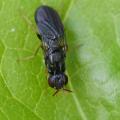



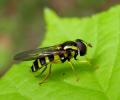
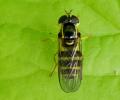

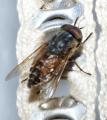
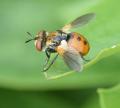



 but don't see the image in the post.
but don't see the image in the post.
